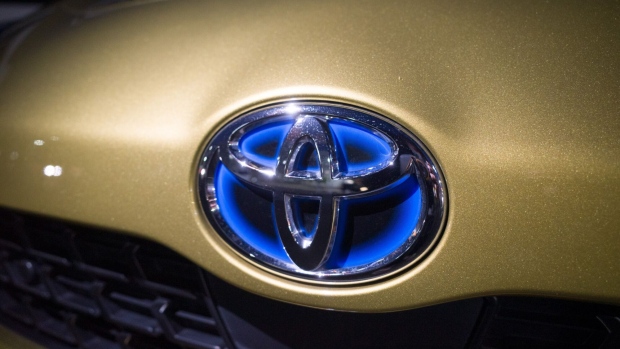May 10, 2023
Toyota Profit Outlook in Line With Estimates, to Buy Back Shares
, Bloomberg News

(Bloomberg) -- Toyota Motor Corp. released a conservative profit forecast for the current fiscal year that aligned with analyst projections, as new Chief Executive Officer Koji Sato seeks to deliver on his pledge to rapidly expand electric vehicle production.
The company’s shares rose as much as 2.5% before closing 0.8% higher after Toyota also announced plans to buy back as much as ¥150 billion ($1.1 billion) of its own stock.
The world’s largest carmaker issued an operating profit outlook of ¥3 trillion for the period through March 2024, in line with analysts’ expectations. Net sales are on track to reach ¥38 trillion, Toyota said, which also aligns with what the market is looking for.
Sato, who oversaw the Lexus luxury-car division before taking over from Akio Toyoda in April, will lead Toyota’s attempt to infiltrate a global EV market currently dominated by Elon Musk’s Tesla Inc. and China’s BYD Co. At the same time, he’ll have to maintain production while component and semiconductor shortages persist.
“Transitioning Toyota from a car company to a mobility company is my foremost priority, the foundation of that shift will be carbon neutrality,” Sato said Wednesday during a media briefing.
Sato promised in April that, by 2026, Toyota will sell 1.5 million battery-based EVs a year and roll out 10 new models — ambitious targets given that it sold 38,000 BEVs in the latest fiscal year. That figure will increase to more than 200,000 units in the current fiscal year, according to Chief Financial Officer Yoichi Miyazaki.
“Around this time last year we couldn’t tell which semiconductors would run out, or when,” Miyazaki said. “It’s still incomplete, but we’ve significantly improved our supply.”
At the same time, Sato is sticking with his predecessor’s strategy of spreading Toyota’s bets across multiple technologies, including gasoline, hybrid and hydrogen fuel-powered cars.
Efforts to eliminate fossil fuels and mitigate climate change hinge on the decarbonization of gargantuan manufacturers such as Toyota, Japan’s largest employer. Toyota will invest ¥3.1 trillion yen on sustainable growth, Sato said, including efforts to decarbonize and electrify.
“Our ultimate goal is to become carbon neutral,” Sato said. “It’s not as simple as shifting to an EV powertrain because that alone won’t lead to long-term change or growth.”
Read more: Japan Studying Plan For EV Firms to Detail Battery Emissions
For the fiscal year ended March, Toyota reported operating profit of ¥2.7 trillion, exceeding analysts’ projection for ¥2.63 trillion and its own conservative forecast of ¥2.4 trillion. Sales rose 18% to ¥37.2 trillion, compared with analysts’ prediction for ¥36.4 trillion.
Operating income increased in Japan and across most of Asia but fell in Europe, China and dropped sharply in North America, Toyota said Wednesday.
Total global auto sales, including for brands Daihatsu and Isuzu, are forecast to reach 11.4 million units for the current fiscal year, Toyota said, up from 10.6 million the prior period.
“The company appointed a new CEO so guidance will probably be conservative and focus on increased income and profit,” Hiroki Ihara, an analyst at Tachibana Securities Co., said prior to Wednesday’s release. “Many issues persist but there aren’t as many negatives as the previous quarter.”
(Updates with shares, management commentary from briefing.)
©2023 Bloomberg L.P.





